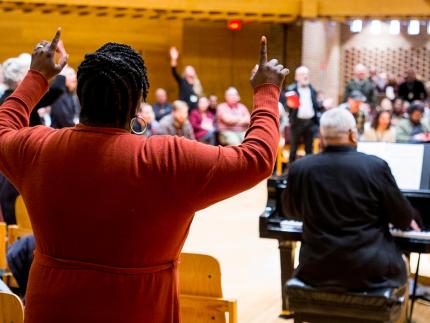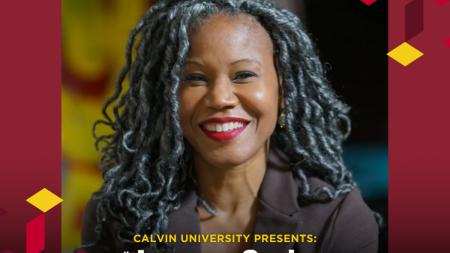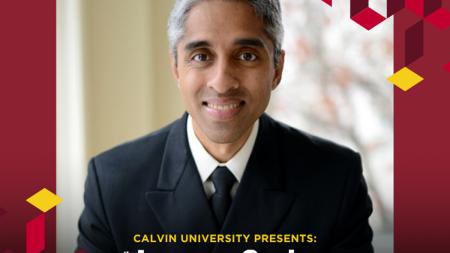Finding Home in the Real God

In a week when a horrific earthquake devastated parts of Türkiye and Syria and when increased bombing from Russia rained down on Ukraine, more than 700 people from across the globe came to worship God on the campus of Calvin University and Calvin Theological Seminary.
Mindful of a world confronted by the ongoing effects of climate change and political and cultural upheaval from Peru to Palestine and from Afghanistan to Hong Kong, participants at the 2023 Calvin Symposium on Worship prayed and sang, attended workshops, and listened to a host of preachers talk about Paul’s letter to the Colossians.
From Wednesday, Feb. 8, through Friday, Feb. 9, attendees and presenters met in person after years of being apart because of COVID-19 restrictions. (The 2022 Calvin Symposium conducted some in-person sessions but was mainly livestream.)
“It’s good to be together again,” said John Witvliet, director of the Calvin Institute of Christian Worship, at the close of the event’s first worship service. The institute and the seminary’s Center for Excellence in Preaching put on the event.
“We have all of you here and some 200 viewers online,” said Witvliet. “We have many students and scholars and professors from various schools. Many of those who are here are attending for the first time.”
In the hallways outside gatherings and presentations at the symposium, said Witvliet, people would be sharing their experiences in worship communities from Lebanon to places in Africa and beyond. They would speak of their challenges and of the Christian faith that sustains them – which they came to the symposium to honor, express, and learn more about.
Witvliet then led the people in prayer, lamenting injustice and violence in the world, and concluded the service by asking everyone to turn to their neighbors and pass the peace of Christ.
Words of Welcome
The opening worship service, held in the Covenant Fine Arts Auditorium and titled “Growing in Grace and Knowledge,” began with these words of welcome from a worship leader: “We gather here to hear the gospel bearing fruit through the whole world. We gather here to worship the one true God.”
And these words were offered in prayer: “Spirit of the Lord, fill this place with your presence. Bring order out of chaos into this world. Break down walls and unite us as your holy family.”
Soon afterward participants joined in singing the Chinese song “Stillness in Awe,” followed by a medley of praise music sung in Shona (a Zimbabwean language), Portuguese, Swahili, Arabic, Korean, and Indonesian.
Jeff and Karen Barker, who teach at Western Theological Seminary in Holland, Mich., stepped forward and recited from heart Colossians 1:1-14, which ends with these words: “For he has rescued us from the dominion of darkness and brought us into the kingdom of the Son he loves, in whom we have redemption, the forgiveness of sins.”
And Scott Hoezee, director of the Center for Excellence in Preaching, delivered the sermon, noting that the subtext of what Paul is telling the Colossians is that they “were lacking serious knowledge. They kept wanting to step back into darkness and belief in a false religion that some other god was better than Jesus Christ.”
In looking at the church today, Hoezee added, we can see what can be called a Colossian problem. “The COVID-19 pandemic led to hybrid worship online. Preachers are aware that sermons are now consumed on YouTube and so are starting to jazz things up, worried that people might fast-forward to another sermon.”
With churches reshaping themselves to meet what they see as the worship needs of the day, Hoezee asked: “Is the church today that far removed from Colossians? People seem to be yearning for something more, something souped up, and they are asking, ‘Is Christ alone worth it?’”
Workshops and More Worship
Following the worship service were workshops on such topics as compelling preaching, using the psalms in worship, and worship in the public square. Scores of other workshops also took place throughout the event.
The Thursday-afternoon worship service, “Worship in All Things,” began with a video clip of colorful stars and swirling galaxies, with a voice-over from Deborah Haarsma that tied to Debra Rienstra, one of the symposium presenters', new book Refugia Faith: Seeking Hidden Shelters, Ordinary Wonders, and the Healing of the Earth.
“Here are images of the universe,” she said. “As we know, the heavens declare the glory of God. . . . All things are created through him. All galaxies contain billions of stars and galaxies. And with the new Webb telescope we are discovering new stars and galaxies God has known all along. Our own galaxy is so small, and yet God has come to us in Jesus Christ.”
Najla Kassab, an ordained minister in the National Evangelical Synod of Syria and Lebanon, noted soon afterward as she preached that while she was at the airport on her way to the symposium, text messages began pouring in on her phone, informing her of the massive earthquake that had just hit Türkiye and Syria.
Reflecting on these words from Colossians 1:17: “He is before all things, and in him all things hold together,” she asked how we might reconcile this text with the fact that thousands of people were killed and many were trapped as homes, businesses, and other buildings broke apart and collapsed into smoking piles of rubble.
“We can feel helpless and out of control and have many questions about God when things like this happen,” she said. “But we believe that God is in all things and is with the people when things seem to be running out of our hands.”
In the world of the Colossians, she added, many people believed in gods that they had to please. And if they didn’t please the gods, people believed that the gods got angry and made bad things – like a horrific earthquake – happen.
“The song Paul sang to the community in this beautiful piece of Scripture is [a call] to believe in Jesus, the visible image of God, even when things are scary,” said Kassab.
“This symposium is about worshiping together and putting Christ first. Worship keeps us going, and it is about putting God right at the center. . . . And we must put out our resources for those who are deeply hurt by the world around them. We are the visible image of God in the world.”
In the end, she said, we can’t lose hope, and we must keep God central in our lives.
A Concern Raised
During a question-and-answer session at a workshop titled “The Challenge and Opportunity of Colossians,” a pastor came to the microphone and asked about what he sees as a major challenge: How should he and other pastors think and preach about Colossians 3:22? Although this passage is in Colossians, it wasn’t a formal focus of the symposium.
This passage reads: “Slaves, obey your earthly masters in everything; and do it, not only when their eye is on you and to curry their favor, but with sincerity of heart and reverence for the Lord.”
This workshop on the challenges of Colossians featured a dialogue between Scott Hoezee and Marianne Meye Thompson, a retired New Testament scholar from Fuller Theological Seminary who wrote a commentary on Colossians.
Thompson admitted that the text referring to slaves is hard to interpret and can be a cause of concern. But, she said, “many Bible stories don’t come with morals. . . . There are hard stories in the Bible. They are just unvarnished and open to interpretation.”
Important to remember, said Thompson, is that beyond the reference to slaves, Paul is telling us that “we are who we are in relation to other creatures and to God. . . .
“We have to acknowledge as a church that we have at times misrepresented the gospel and tried to flaunt our superiority. We have not heard the needs that others are crying out for, and that is wrong. We have to have much more humility in how we understand our own identity, which we must realize is held together in humility in Christ.”
A Retort
After a rocking, rollicking bevy of praise music that started off the worship service on Thursday evening, Marshall E. Hatch, pastor of New Mount Pilgrim Missionary Baptist Church in Chicago, addressed some concerns brought up by Colossians 3:22.
“African Americans, who have been oppressed and exploited and lacked justice, have a problem with passages such as this about slaves obeying their masters,” he said.
Yet, a deeper reading of Scripture and of Paul, said Hatch, speaks of Christ, “who was revealed as an outsider. He was born at the bottom of the Roman Empire. He was a colonized person.” In substantial ways, Christ felt compassion for and could empathize with people who are enslaved.
Meanwhile, said Hatch, God has used the Black church and theologians to preach a theology arising out of the suffering of Christ and his care and love for those who have been ignored and kept down.
“To be rooted in Christ is to root for Christ,” said Hatch. “This rootedness in Christ converts the human soul. Christ is in all and is all I need. Christ gives liberation from all that binds us.”
Wearing the Right Clothes
Before the symposium closed on Friday afternoon with an invitation to participate in communion in the Covenant Fine Arts Center, Laura de Jong, interim pastor of preaching and pastoral care at Community CRC in Kitchener, Ont., preached on Colossians 3:12-17.
In this final worship service, titled “A Chosen and Thankful People,” de Jong exhorted listeners not to “put on ill-fitting clothing” but to be clothed in the saving grace and in the loving presence of Christ.
“People today are asking, ‘What does a real church look like?’” she said. “They are also asking if their own church is doing things right” and how they can encourage young people to stay.
They are wondering, she said, if they are providing the kind of worship experience people are looking for. Yet then, she said, “‘What do other churches have that we don’t have?’ becomes our focus. ‘If we can just become like that church, we think we can be OK.’”
But instead of falling into fear and anxiety over which programs ought to be dropped and which ones launched, said de Jong, we should listen to the words of Colossians 3:12: “Therefore, as God’s chosen people, holy and dearly loved, clothe yourselves with compassion, kindness, humility, gentleness and patience.”
With this reminder, she assured listeners that they need not look to other means of finding God. Instead, God is right here with and in front of us.
“We don’t need to put on new shiny clothes to show people we are the church they want to be part of,” said de Jong. “Paul reminds us that God does not cast us aside. God’s love is big and never ending. This is what it means to be a church. . . . We lift our hearts and eyes in worship to God, not glancing sideways at our neighbors.”
And with that, she helped prepare the bread and wine, symbolizing the body and blood of Jesus, and, along with other pastors, invited people to come to the table in remembrance of him.


